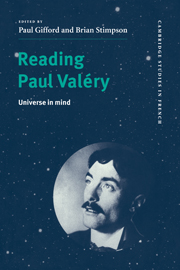Book contents
- Frontmatter
- Contents
- Contributors
- Abbreviations
- Introduction
- PART 1 SELF-SCIENCE
- PART 2 SELF-WRITINGS
- 6 The poetics of practice and theory
- 7 ‘Esprit, Attente pure, éternel suspens …’: Valéry's prose poetry
- 8 Counter-fiction
- 9 The Dialogues and Mon Faust: the inner politics of thought
- 10 Major poems: the voice of the subject
- 11 Other voices: intertextuality and the art of pure poetry
- 12 Manuscript steps: ‘Les Pas’
- PART 3 BODY, MIND, WORLD
- Conclusion
- Bibliography
- Index
- Cambridge Cultural Social Studies
6 - The poetics of practice and theory
Published online by Cambridge University Press: 04 August 2010
- Frontmatter
- Contents
- Contributors
- Abbreviations
- Introduction
- PART 1 SELF-SCIENCE
- PART 2 SELF-WRITINGS
- 6 The poetics of practice and theory
- 7 ‘Esprit, Attente pure, éternel suspens …’: Valéry's prose poetry
- 8 Counter-fiction
- 9 The Dialogues and Mon Faust: the inner politics of thought
- 10 Major poems: the voice of the subject
- 11 Other voices: intertextuality and the art of pure poetry
- 12 Manuscript steps: ‘Les Pas’
- PART 3 BODY, MIND, WORLD
- Conclusion
- Bibliography
- Index
- Cambridge Cultural Social Studies
Summary
Poetics, in its modern acceptance, is closely linked with the name of Valéry. He it was who refloated the ancient Aristotelian term and charged it with a new meaning reflecting the conception of poetry which, as the acclaimed poet of La Jeune Parque and Charmes – and very much against the prevailing aesthetic of the time – he was led on numerous public occasions to expound: a conception oriented towards the most rigorous exigencies of poetic form.
Poetics was, indeed, quickly perceived as the key notion defining Valéry's intellectual stance; all the more readily since, when the Collège de France created for him a chair, which he held from 1937 until his death in 1945, it was officially designated a ‘Chair of Poetics’. Nothing however assures us that the same word has the same sense in its public and private usages; and many misunderstandings have arisen from this. It will be prudent to distinguish here, on the one hand, the theory of poetic composition which Valéry formulated essentially from his own poetic practice, and which the Cahiers have considerably enriched, and, on the other, the approach to analysing the functioning of literary works which is sketched out in the lectures at the Collège de France as a true discipline of the future. It is out of just such a semantic oscillation – despite Valéry's own attempt at rigorous definition – that the later career of the word has, to an extent, been made.
- Type
- Chapter
- Information
- Reading Paul ValéryUniverse in Mind, pp. 105 - 120Publisher: Cambridge University PressPrint publication year: 1999

